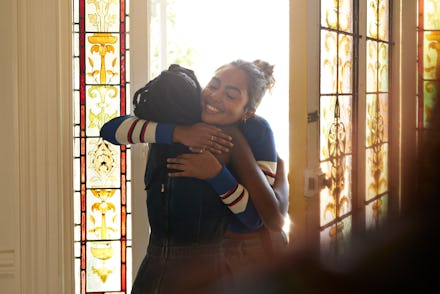Are hugs and handshakes gone for good?

One of my friends came to change my tire this morning after I got stranded trying to take my cat to the vet for an emergency visit. By the time my friend arrived with her jack and toolkit, I was in full meltdown mode. “I wish I could hug you,” she said. That just made me cry harder. How do you greet a crying friend who needs a hug in the face of global disaster when you’re not allowed to touch? Actually, a better question might be: How do you greet anyone during coronavirus? I, personally, am feeling a dark interpersonal void where handshakes, high fives, and kisses used to be.
I must preface this discussion saying that I’m not a hugger. I usually put out a hand and also kiss a cheek. It’s an awkward Euro American dance, but most folks catch on. The handshake comes from my mid-atlantic formative years and the cheek kiss is a holdover from either six years in Miami or six months in Paris, I’m not sure which. It doesn’t matter because no part of it is acceptable anymore. On top of all that, physically interacting is a big part of meeting new friends. Obviously, that’s not happening much right now. When that day comes, how will I greet them? With a nod? A blink? A bow?
Is the awkward head nodding going to last forever?
“Even though restrictions are diminishing, caution is a necessary part of human interaction,” Patricia Celan, a psychiatrist at Dalhousie University in Canada tells me. “Where people used to hug, I've seen air hugs from a distance. Where people used to shake hands, I now see awkward hand waves.” That’s what I see, too. It’s also what I do. But that’s now. Is the awkward head nodding going to last forever?
“I expect we will continue to see miming or gesturing the greetings we used to do for at least a year or two,” Celan says. “Over time, it is possible that physically closer greetings will return once the threat of the pandemic is almost fully eradicated.” So not forever, then, but definitely for a while. A year or two seems like a long time to go without a handshake, I know, but until it’s safe to swap skin cells, I’m just going to have to adapt.
And I can. “The etiquette of how we greet each other is based on precedent,” says Jodi Smith, a Massachusetts-based etiquette consultant. “We have seen this before. As recently as the H1N1 epidemic of 2009, we had a brief break with our handshaking protocols.” Smith recalls how, at that time, fist bumps seemed like an acceptable alternative.
He echoes Celan about how our fear-fueled greetings will thaw out. “The warmth of actual contact during a greeting will rebound as the pandemic recedes.” All the experts agreed that we will return to our own cultural norms eventually, but also that, like my bizarre bicultural kiss-shake indicates, we are also capable of adapting to new cultural expressions of relating to each other.
Even our cursory head nods, Smith explains, are cultural mash-ups. “While we rarely see the Asian bow or the curtsy one might offer the Queen of England here in the United States, our head nods are truncated bows,” he explains. The head nod — as abrupt as it might seem — is a gesture of courtesy and acknowledgement. The experts I spoke with agreed that the style we greet each other with is both cultural and somewhat arbitrary. What matters, it seems they all said, is not how or with which parts of the body we say hello, but that we simply make the gesture.
“Younger generations will see this transition as more of an opportunity to stand apart from the masses.”
Almost any gesture will do, and some people think that we may have some creative interpretations to look forward to. “Be prepared to see a range of awkward waves, creative throwbacks like the Kid ‘n Play foot tap, and totally random inventions inspired by the latest Internet memes,” says Neil Gordon, a New York City-based public speaking coach. His prediction seems to be spot on. There’s currently a — corporately sponsored — Tik Tok campaign to “find the next high five.”
Some of the now old-fashioned greetings like hugging and handshaking will probably come back, then, but new expressions will come, too. Which greeting you use both now and in the future will depend on your age and cultural affiliations, just like it often has. “Younger generations will see this transition as more of an opportunity to stand apart from the masses,” Godron predicts.
Personally, I’m not looking for the next high five, but I might welcome a comeback of the air kiss. I don’t know exactly what that says about me, but I guess I’ll find out the first time I have to do the foot tap-air kiss shuffle.